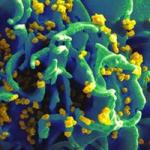
Research Topics
Our group studies polyomaviruses. A great majority of healthy adults chronically shed polyomavirus virions in their urine and from the surface of their skin. Although these lifelong infections generally aren't known to cause symptoms in healthy individuals, under conditions of immune impairment polyomaviruses can cause disease. For example, BK polyomavirus (BKV) causes kidney and bladder damage in organ transplant patients, while its close relative JCV causes a lethal brain disease in patients on immunosuppressive therapies and in individuals suffering from HIV/AIDS. An increasingly compelling body of evidence indicates that BKV and JCV cause bladder cancer, at least in rare cases.
Virus discovery efforts led by our lab have uncovered the existence of several human polyomavirus species (HPyVs 6, 7, 10, and 16). The organizing focus of work in the lab is the functional biology of viral capsids. By applying basic-science knowledge of capsid biology, our group has pioneered the development of polyomavirus-based gene transfer vectors. These vectors (also known as pseudoviruses) deliver encapsidated reporter plasmids to the cell nucleus via pathways that resemble the infectious entry of authentic virions. In addition to their utility for studying the mechanics of infectious entry, these tools have a variety of other applications. For example, we use pseudoviruses to perform high-throughput analyses of neutralizing antibody responses. A primary goal of our current work is to understand how polyomaviruses evolve to evade antibody-mediated neutralization. This work has opened the door to our ongoing clinical development of virus-like particle vaccines against BKV and JCV.
Biography
Dr. Buck received a bachelor’s degree in Molecular Cellular and Developmental Biology from the University of Colorado at Boulder. He then returned to his home state, Maryland, to earn a Ph.D. from the Johns Hopkins School of Medicine. Dr. Buck’s graduate research in Dr. Robert Siliciano's lab focused on the translation and immunogenicity of the HIV-1 capsid protein Gag. For his graduate work, Dr. Buck received the Alicia Showalter Reynolds Award. In 2001, Dr. Buck began post-doctoral training in the Lab of Cellular Oncology, where he developed systems for producing human papillomavirus (HPV)-based gene transfer vectors (pseudoviruses). His work using HPV vectors ranged from basic studies of HPV virion structure and morphogenesis to translational research identifying candidate topical microbicides for blocking HPV transmission. For his work in these areas, Dr. Buck, and his mentors, Drs. John Schiller and Doug Lowy, shared the 2006 Norman P. Salzman Award. In 2007, Dr. Buck joined the faculty of the NCI’s Center for Cancer Research as an Investigator. In 2013, he shared a second Salzman Award in recognition of his mentoring of Dr. Rachel Schowalter. Dr. Buck was awarded tenure in 2014.
Selected Publications
- Tisza MJ, Pastrana DV, Welch NL, Stewart B, Peretti A, Starrett GJ, Pang YS, Krishnamurthy SR, Pesavento PA, McDermott DH, Murphy PM, Whited JL, Miller B, Brenchley J, Rosshart SP, Rehermann B, Doorbar J, Ta'ala BA, Pletnikova O, Troncoso JC, Resnick SM, Bolduc B, Sullivan MB, Varsani A, Segall AM, Buck CB. Discovery of several thousand highly diverse circular DNA viruses. Elife. 2020;9.
- Starrett GJ, Buck CB. The case for BK polyomavirus as a cause of bladder cancer. Curr Opin Virol. 2019;39:8-15.
- Peretti A, Geoghegan EM, Pastrana DV, Smola S, Feld P, Sauter M, Lohse S, Ramesh M, Lim ES, Wang D, Borgogna C, FitzGerald PC, Bliskovsky V, Starrett GJ, Law EK, Harris RS, Killian JK, Zhu J, Pineda M, Meltzer PS, Boldorini R, Gariglio M, Buck CB. Characterization of BK Polyomaviruses from Kidney Transplant Recipients Suggests a Role for APOBEC3 in Driving In-Host Virus Evolution. Cell Host Microbe. 2018;23(5):628-635.e7.
- Geoghegan EM, Pastrana DV, Schowalter RM, Ray U, Gao W, Ho M, Pauly GT, Sigano DM, Kaynor C, Cahir-McFarland E, Combaluzier B, Grimm J, Buck CB. Infectious Entry and Neutralization of Pathogenic JC Polyomaviruses. Cell Rep. 2017;21(5):1169-1179.
- Ray U, Cinque P, Gerevini S, Longo V, Lazzarin A, Schippling S, Martin R, Buck CB, Pastrana DV. JC polyomavirus mutants escape antibody-mediated neutralization. Sci Transl Med. 2015;7(306):306ra151.
Related Scientific Focus Areas


Microbiology and Infectious Diseases
View additional Principal Investigators in Microbiology and Infectious Diseases

This page was last updated on Monday, August 11, 2025